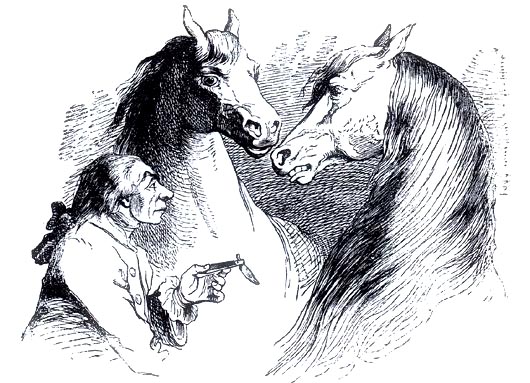 |
| Gulliver in discussion with Houyhnhnms, by J.J. Grandville (1856) (Wikipedia) |
Note: Many of us know that Jonathan Swift's protagonist in Gulliver's Travels met little people and giants, but there were other interesting encounters on subsequent voyages. Here's one.
Get Ready: This part of Gulliver's Travels seems to say that people are bad. Do you agree? Are people basically good or not?
Do you remember Lemuel Gulliver, the (fictional) 18th-century Englishman who traveled to faraway exciting lands peopled with tiny humans, giants, immortals, and many more? We met him in Lesson #08-134.
On his fourth and final trip Gulliver was marooned among the Houyhnhnms, talking horses (whose name sounds like the whinny of a horse).
By dint of their superior intellects, the gentle, rational Houyhnhnms were masters of their island, which they cohabited with a savage race of humanoid creatures called the Yahoos. Although Gulliver resembled the beastly Yahoos, he preferred the company of the horse-like creatures, and learned their language.
When he first landed on the island (after a mutiny among his men) Gulliver was attacked by the violent Yahoos, whom he took to be longhaired animals, with their goatlike beards and sharp claws (used for climbing trees). He was saved when a Houyhnhnm appeared, causing the Yahoos to scatter. Only later did he realize these "beasts" were actually (in a sense) human.
It took some time for the Houyhnhnms to realize that Gulliver was not, in fact, a Yahoo himself. For his part, he learned that the Houyhnhnms lived in houses like humans, and engaged in human-like activities.
As Gulliver spoke of war, religion, and other "civilized" matters in England, the Houyhnhnm began to realize that while the Yahoos of his own land were true to their low nature, those of England were much worse because, having a kind of reason, they behaved so terribly.
On the other hand, there was so little evil behavior among the Houyhnhnms that they didn't even have words for wrong acts. When Gulliver spoke of lying, for instance, he had to call it "saying the thing which is not," as there was no single word for it.
In the end, although the Houyhnhnms recognized a certain intelligence in Gulliver, they held a council and decided that he was, after all, just a sophisticated Yahoo, and would have to leave their island.
He had a hard time relating to the "rational Yahoos" he met on the ship that rescued him. When he returned home, he was likewise uncomfortable with the "Yahoos" there, and became a recluse who spent hours every day down at his stables speaking with his horses.
--------- Read more: https://en.wikipedia.org/wiki/Gulliver%27s_Travels#Part_IV:_A_Voyage_to_the_Land_of_the_Houyhnhnms
- Read Part IV of Gulliver's Travels FREE online
Practice: Match the term to its definition below:
- by dint of
- cohabited
- humanoid
- marooned
- peopled with
- rational
- a recluse
- resembled
- scatter
- stables
- looked like
- buildings where horses live
- occupied by
- as a result of; by means of
- capable of intelligent thought
- like a person
- lived together with
- a person who prefers to be alone
- run off in many directions
- stranded; left behind
Answers are in the first comment below.
Submitted to the Shenzhen Daily for December 13, 2022


Answers to the Practice: 1. d; 2. g; 3. f; 4. j; 5. c; 6. e; 7. h; 8. a; 9. i; 10. b
ReplyDelete